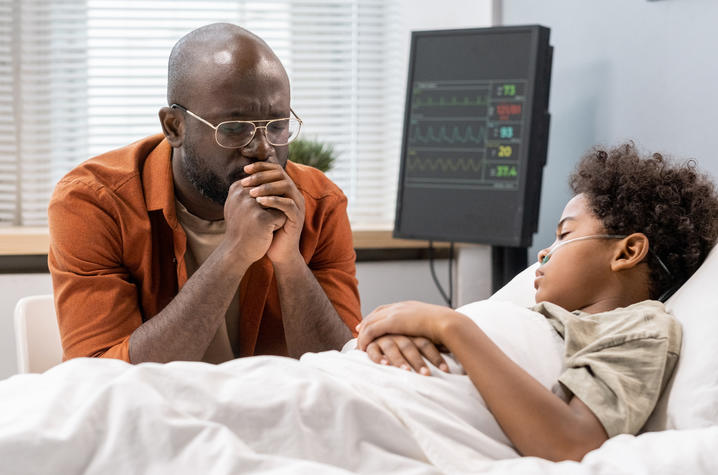Emotional medical trauma impacts caregivers of those with injuries and illness

The University of Kentucky Public Relations and Strategic Communications Office provides a weekly health column available for use and reprint by news media. This week's column is by Tess E. Smith-Thomas, Ph.D., assistant professor in the UK College of Medicine who works in palliative care at Kentucky Children’s Hospital.
LEXINGTON, Ky. (May 22, 2023) — Caring for a loved one with a chronic or terminal illness or injury can be emotionally and physically exhausting. In addition to possible worries, stress, guilt, and fear of the unknown, caregivers can experience a loss of identity and independence, and have trouble balancing other aspects of their lives and responsibilities while caring for their loved one. All of these challenges can place caregivers at risk for experiencing medical trauma.
Medical trauma is the emotional response to medical diagnoses, care or treatments. Medical care and treatment don’t just affect the individual, but their loved ones as well. Every year, millions of caregivers experience symptoms of emotional medical trauma.
It is important for caregivers to recognize the signs and symptoms of medical trauma in others or in themselves. These symptoms can develop from a single medical experience or ongoing medical care. Symptoms of medical trauma can include:
- Avoidance: Avoiding reminders of medical care such as driving by the hospital, attending appointments, phone calls from medical providers, talking or thinking about anything related to medical condition or care.
- Re-experiencing: Flashbacks of receiving a diagnosis or injury event or a part of medical care, repeated conversations about the medical condition or care, thoughts repeating over and over again.
- Hyper-arousal: Difficulty sleeping, irritability, difficulty concentrating or feeling “on edge.”
- Changes in mood/cognition: Increased feelings of sadness, frustration, and worries; negative thoughts; and withdrawing or isolating from others.
Here are some tips for caregivers to take care of themselves while caring for their ill or injured loved one:
- Engage in self-care. Think about what you need and start by just doing one thing for yourself.
- Recognize your signs of stress and find small ways to take a break, such as a short walk, listening to music, engaging in a 5-minute breathing exercise, or journaling.
- When coping with fears of the unknown, try to focus on what you can control. It might be helpful to get organized and make a plan, while allowing for flexibility if things don’t go exactly as planned;
- Rely on your support system and accept help, whether just for an ear to listen or to run a quick errand. Know that you may not be able to do it all during this time, and that’s ok.
Keep in mind that these strategies might be helpful, but are not a replacement for a mental health professional. If you or a loved one are experiencing symptoms of medical trauma, reach out to your doctor or a mental health professional for additional support.
UK HealthCare is the hospitals and clinics of the University of Kentucky. But it is so much more. It is more than 10,000 dedicated health care professionals committed to providing advanced subspecialty care for the most critically injured and ill patients from the Commonwealth and beyond. It also is the home of the state’s only National Cancer Institute (NCI)-designated Comprehensive Cancer Center, a Level IV Neonatal Intensive Care Unit that cares for the tiniest and sickest newborns and the region’s only Level 1 trauma center.
As an academic research institution, we are continuously pursuing the next generation of cures, treatments, protocols and policies. Our discoveries have the potential to change what’s medically possible within our lifetimes. Our educators and thought leaders are transforming the health care landscape as our six health professions colleges teach the next generation of doctors, nurses, pharmacists and other health care professionals, spreading the highest standards of care. UK HealthCare is the power of advanced medicine committed to creating a healthier Kentucky, now and for generations to come.




